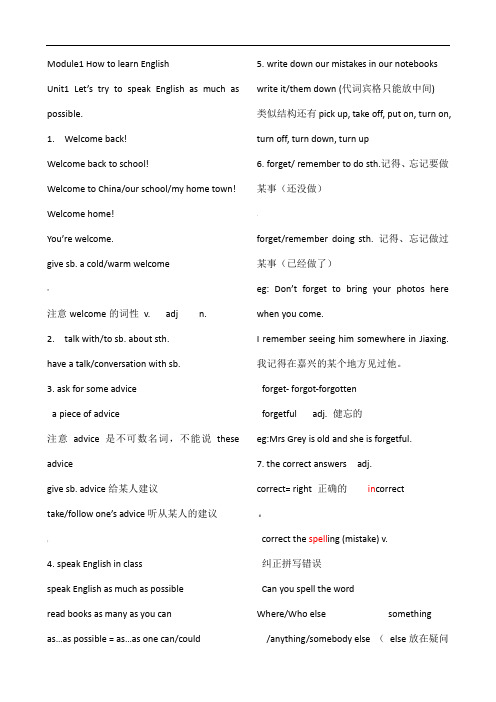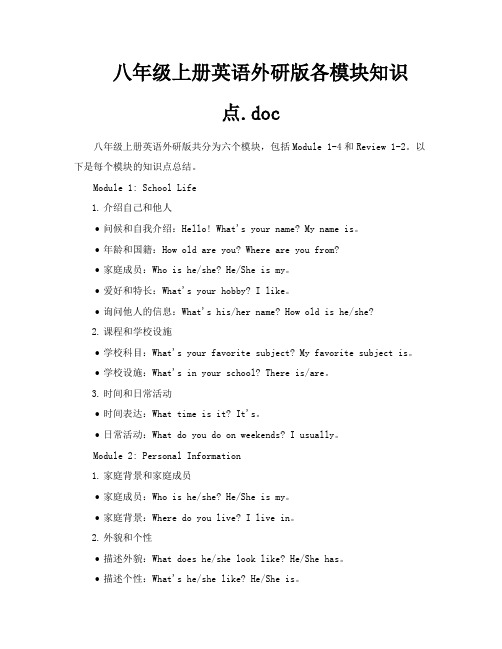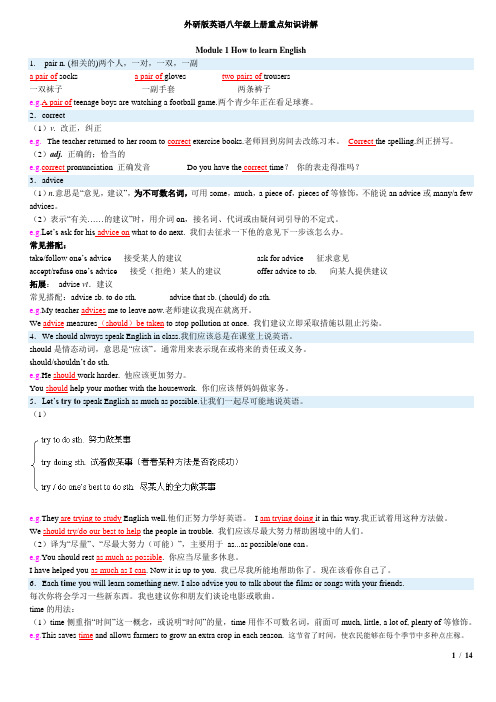八年级英语Module 1外研社(初中起点)知识精讲
- 格式:doc
- 大小:58.50 KB
- 文档页数:5

Module 1 How to learn EnglishUnit 1 Let’s try to speak English as much as possible一.重点词汇1.advice. n .名词. 意见,建议【点拨】: advice 表示意见建议,为不可数名词。
没有复数形式,修饰advice 的不能为many, a few , 可以为:some , any, a lot of 等中性词。
【变形】: advise ,动词。
向某人提出建议, 忠告,建议.固定搭配为:advise sb to do sth 建议某人做某事,是接to do .【名词辨析】:news 新闻,information 资料信息(不可数名词),message ,短信(可数名词), help帮助【应用】1.造句:你能够给我一些关于如何学习弹钢琴发面的建议吗?2.造句:爸爸总是建议我应该接受别人的好的意见3.Here is my _______(建议)on learning English .4.---What ______do you have for Jim?----I think he should study harder than beforeA. NewsB. informationC. messageD. advice .2.Forget . v. 动词. 忘记.【点拨】: foget 表示忘记,及物动词。
过去式为:forgot .【辨析】: forget to do sth , forget doing sth.forget to do sth :表示不要忘记去做某事,事情还没有做。
Don’t forget to bing your book here .不要忘记把书带到这里。
Don’t forget to turn off the lights when you leave .当你离开时,不要忘记关灯。


外研版初⼆上Module1知识点总结(全)Module 1 How to learn English1. translate v. 翻译translate…into…把…翻译成…eg: Please translate these words into Chinese.translation n. 翻译translator n. 翻译家2.number v. 给…标号码n.数字;号码{a number of 许多的;⼤量的后接名词复数,作主语时当复数使⽤the number of …的数量后接名词复数,作主语时当单数使⽤eg; A number of visitors come to our hometown today, the number of them is about 160.3.advice n. 建议advice是不可数名词,通常⽤much, little, a little, some, a lot of 修饰eg: My teacher gave me some advice on my study.a piece of advice ⼀条建议some pieces of advice=some advice 许多条建议take/follow sb’s advice 接受某⼈的建议give sb. some advice = give some advice to sb. 给某⼈⼀些建议advise v. 建议advise sb. to do sth. 建议某⼈做某事4.mistake n. 错误make a mistake 犯错误make mistakes 犯很多错误by mistakes 不⼩⼼do sth. by mistake 误做某事mistake sb. for sb. 把某⼈误认为某⼈5.try (not) to do sth. 尽量(不要)做某事eg: Please try not to translate every word.try one’s best to do sth. 尽某⼈最⼤的努⼒做某事eg: I will try my best to learn English.try doing sth. 试着做某事eg: He tried reading the English novel.6.write down 写下,记下(同义词put down)write it down 写下它,记下它(代词只能放中间)write down these wordswrite these words down 写下这些词(名词放中间和后边都可)7.表建议:Why don’t you do sth.? 你为什么不…?eg: Why don’t you play with me?Why not do sth.? 为什么不…?eg: Why not play with me?What/How about doing sth.? …怎么样?eg: What/How about having lunch together?Let’s do sth. 让我们做某事eg: Let’s go and have a look.Shall we do sth.? 我们做某事好吗?eg: Shall we play computer games?8.表劝告:advise sb. to do sth.eg: She advised me to study hard.You’d better do sth. 你最好做某事eg: You’d better go to see a doctor.It’s a good idea to do sth. …是个好主意eg: It’s a good idea to do exercise twice a week.try (not) to do sth. 尽量(不)做某事eg: Try to write the words quickly.9.remember doing sth.记得做过某事(做完了)remember to do sth. 记得要做某事(没做过)eg: I remembered closing the door when I left home.(我记得我离开家时关了门)Remember to close the door when you leave.(当你离开时,记得要关门)forget doing sth. 忘记做过某事(做完了)forget to do sth. 忘记要做某事(没做过)eg: I forgot washing my clothes. (我忘了洗完⾐服这件事)I forgot to wash my clothes.(我忘了去洗⾐服)10.see sb. do sth 看到某⼈做了某事(经常性或全过程)see sb. doing sth 看到某⼈正在做某事(正在进⾏)⼀感feel⼆听listen to, hear 三让make, let, have四看see, watch, look at, notice等词有相同⽤法11.smile at sb. 向某⼈微笑eg: The little boy is smiling at me.laugh at sb. 嘲笑某⼈eg: Don’t laugh at others.12.borrow v. 借⼊borrow sth. from sb./sw. 从…借某物eg: She often borrows books from the library.lend v. 借出lend sb. sth.= lend sth. to sb. 把某物借给某⼈eg: She lent her CDs to her friends yesterday.keep v. 保存(延续性动词)表借某物之后保存⼀段时间,常和段时间连⽤13.hear of = hear about 听说hear + that 从句听说14.hope to do sth. 希望做某事(只有这⼀种形式,不加sb.)wish to do sth. 希望做某事wish sb. to do sth. 希望某⼈做某事15.sb. spend 时间/⾦钱on sth 某⼈花费时间/⾦钱在某物上sb. spend时间/⾦钱(in) doing sth 某⼈花费时间/⾦钱做某事It takes sb. 时间/⾦钱to do sth.. 花费某⼈某些时间做某事16.look for 寻找(指找的动作过程)find 找到,发现(指找的结果)find out 搞清楚,查明⽩17.each 表⽰⼀定数⽬中的“每⼀个”,强调个体意义every 表⽰不确定数⽬中的“每⼀个”,强调整体意义eg: Every student went to the farm and each picked a basket of apples.18.玩的开⼼,过得愉快enjoy oneselfhave a good/great timehave fun19. look 后常接at 表看的动作see 强调看的结果watch 观看;注视常⽤于:watch TV/match19.welcome back to sw. 欢迎回到某地welcome to do sth 欢迎做某事welcome sb. to do sth 欢迎某⼈做某事20.else (同义other) 别的,其他的else 放在疑问词和不定代词之后other ⽤于名词前or else否则,要不然21.leave a message for sb. 给某⼈留⾔take a message for sb. 给某⼈稍⼝信22.do some concerts = give some concerts 举⾏⾳乐会23.each(同义词every) 每个当句⼦的主语以each开始时,谓语动词⽤单数当each位于⼀个复数主语之后时,动词⽤复数each other 互相(两者)one another 互相(三者)24. send for sb. 派⼈去请某⼈send out 发送send off 寄出24.It’s a good idea to do sth. 做某事是⼀种好的⽅式25.because+句⼦because of+短语26.watch out=look out=be careful ⼩⼼,当⼼27.talk about sth. with sb.=discuss sth with sb.和某⼈讨论某事28.the meaning of ……的意思29.have a conversation with sb. 和某⼈交谈30.take a deep breath 深呼吸lose one’s breath喘不过⽓来be out of breath 上⽓不接下⽓hold one’s breath 屏住呼吸be deep in 专⼼于31.take the place of…代替…32.make a list 列表33.be good for…对…有好处be bad for…对…有害处34.say hello to sb. 向某⼈问好35.show sb around sp. = take sb. around sp. 带领某⼈参观某地36.make friends with sb. 和某⼈交朋友37.all the time = always 总是;⼀直all the time⽤于句尾always ⽤于句中38.invite sb. to sp. 邀请某⼈去某地invite sb. to do sth. 邀请某⼈做某事39.correct the mistakes 改错40.learn sth. from sb. 向某⼈学习某物41.in the order 按顺序in order to 为了42. for example = such as 例如43. best wishes to sb. 送给某⼈最好的祝愿。

Module 1 How to learn English模块小结思维导图知识要点知识要点一、重点单词,短语和句式要点1 correctorrect v.改正;纠正correct adj. 正确的(同义词right,反义词wrong/incorrect)correctly adv. 正确地【典例分析】用词的正确形式填空1.Choose the___________ (correct)order according to the passage.【点拨】correct 正确的。
形容词。
order 名词前面用形容词修饰。
2.Can you spell it ___________(correct)?【点拨】correctly 正确地。
修饰动词用副词。
3.Can you ___________ (correct)my pronunciation?【点拨】correct 订正,纠正。
动词。
要点2 practisepractise 后可跟名词、代词和动词的-ing 形式,不能接不定式。
practise的基本意思是“练习”、“训练”。
practise和practice,在英国英语中,两者分别是动词和名词;但在美国英语中,没有区分,都可以是动词或名词,两词发音一样,作名词时作“练习”讲一般为不可数名词。
【典例分析】1.These foreigners are practicing ______ Chinese.A. to speakB. speakingC. speakD. speaks【点拨】B practise后面接动词ving形式。
2. 熟能生巧。
____________ makes perfect.【点拨】Practice 名词。
练习,训练。
要点3 few, a few, little 与a little的辨析a few修饰可数名词的复数形式few 作代词,表示“很少人(或事物、地方)”【典例分析】1. Please hurry up. There is _________ time left.【点拨】little。

外研版八上Module1 Unit1 Let's try to speak Englishas much as possible.知识精讲知识点一Work in pairs.pair/peə/n. 一对,一双,一副vt. 把…组成一对考点1 a pair of表示“一双/副”,后常接表示成双成对的复数名词。
eg:This pair of shoes fits me well.这双鞋对我很合适。
Let’s act out the dialogue in pairs.让我们两人一组表演对话吧。
考点2 ...pair(s)of+可数名词复数”作主语时,谓语动词的单复数应与pair 的单复数保持一致。
eg:This pair of shoes is mine.这双鞋是我的。
Pairs of socks are pinned together.成双的袜子是别在一起的。
例题:A pair of trousers _____lying on the chair just now.A.wasB.wereC.isD.are解析:答案A。
句意:椅子上刚才放着一条裤子。
本句的主语是A pair of trousers,因此谓语动词用单数形式,故选A。
知识点二:Correct the spelling.Correct adj. 正确的;得体的v. 改正;纠正考点1 v. 改正;纠正eg:I must correct him on a minor point.我必须纠正他的一处小错误。
考点2 adj. 正确的;得体的(同义词right,反义词wrong/incorrect)correctly adv. 正确地Eg:The correct answers can be found at the bottom of page 8.正确答案在第8页末尾。
You are absolutely correct.你说的很对。

Module1 How to learn EnglishUnit1 Let’s try to speak English as much as possible.1.Welcome back!Welcome back to school!Welcome to China/our school/my home town! Welcome home!You’re welcome.give sb. a cold/warm welcome*注意welcome的词性v. adj n.2.talk with/to sb. about sth.have a talk/conversation with sb.3. ask for some advicea piece of advice注意advice是不可数名词,不能说these advicegive sb. advice给某人建议take/follow one’s advice听从某人的建议;4. speak English in classspeak English as much as possibleread books as many as you canas…as possible = as…as one can/could 5. write down our mistakes in our notebooks write it/them down (代词宾格只能放中间)类似结构还有pick up, take off, put on, turn on, turn off, turn down, turn up6. forget/ remember to do sth.记得、忘记要做某事(还没做)·forget/remember doing sth. 记得、忘记做过某事(已经做了)eg: Don’t forget to bring your photos here when you come.I remember seeing him somewhere in Jiaxing. 我记得在嘉兴的某个地方见过他。

Module 1 How to learn EnglishUnit 1Let's try to speak English as much as possible.知识讲解知识点1 Practise /'præktIs/ v. 练习、训练考向一【重点】practise+名词、代词、动名词,不能接不定式。
eg:They're practising singing the new song. 他们正在练习唱那首新歌。
注意practice名词“练习”一般为不可数名词。
在英国英语中,practise v.和practice n.在美国英语中,practise和practice都可以是v.或n.考向二【易错点】practise后跟动名词作宾语,类似的动词(短语)还有:finish enjoy suggest keep mind miss avoidlook forward to have trouble in典例Before she went abroad, she spent as much time as she could___ English.A.to practise to speakB. practising speakingC. to practise speakingD. practising to speak【点拨】在她出国之前,她用了尽可能多的时间练习说英语。
这里考查两个动词的搭配。
第一个,spend time on sth./in doing sth.中in可省略,花时间在某事上/做某事:第二个practise后接动名词,不接不定式。
考向三【重点】practise与exercise的辨析practice:有规律地练习,特指反复练习。
eg:He practises English every day.他每天练习英语。
exercise:指训练,锻炼,操练。


Unit1 核心词汇讲解1. correct /kəˈrekt /v. 改正,纠正adj. 正确的;对的【例句】I corrected my own mistakes. 我改正了我自己的错误。
He gave me three correct answers. 他给了我三个正确的答案。
【拓展】correct 近义词:right 正确的;true 对的,真的;accurate 准确无误的反义词:wrong 错误的派生词:correctly 正确地incorrect 不正确地2. spelling /ˈspelɪŋ /n. 拼写【例句】He is not good at spelling. 他不善于拼写。
【拓展】在有些动词后加-ing可变为名词。
常见的符合此类构词法的词有:3. practice /ˈpræktɪs/v. 练习【例句】You need to practice every day. 你需要每天练习。
【解析】practice doing sth. 练习做某事。
【拓展】practise 是英式英语的写法,在美式英语中写成practice。
4. mistake /mɪˈsteɪk /n. 错误,过错【例句】I looked over the notes and found some mistakes.我把笔记检查一遍,发现了一些错误。
【拓展】含有mistake的短语有:by mistake 错误地make a mistake/mistakes 犯错误5. understand /ˌʌndəˈstænd /v.理解;明白【例句】Do you understand my meaning? 你明白我的意思吗?【拓展】understand的过去式和过去分词为understood。
6. advice /ədˈvaɪs /n. 意见;建议【例句】I took my father’s advice and went to the station early. 我承受父亲的建议,早早去了车站。

初二英语Module 1外研社(初中起点)【本讲教育信息】一. 教学内容:Module 1二. 教学重点、难点:1. 准确熟练地掌握本模块的“重点词汇和短语”。
2. 能够用英文介绍新同学,老师的新课表。
三. 语法:感叹句感叹句主要由what和how引导。
其结构分别是:What a\an+形容词+名词(+主语+谓语)!如:What a beautiful girl she is!How+形容词+主语+谓语!如:How busy Miss Black is!感叹句用于表示强烈的感情,what修饰名词,how修饰形容词,但当名词前还有形容词时就容易判断错误。
如:________beautiful flowers!此句应用what来引导,但有时会错用how来引导,下面有一个感叹句引导词的判断技巧。
[注意]我们知道,感叹句也是句子,只不过把强调部分放在句首,因此它也应该有主语和谓语,有时候主语和谓语被忽略了,我们可把主语和谓语补上。
What a lovely day! —What a lovely day it is!What beautiful flowers! —What beautiful flowers they are!What important news! —What important news it is!How fast! —How fast it goes!(不同情况下,此句有不同主谓)How happy! —How happy they are!(不同情况下,此句有不同主谓)仔细观察后你就会发现,在感叹句的主语前若还有名词存在时,要用what来引导,在感叹句的主语前若无名词时,则用how 来引导。
[注意]:在how+形容词+a\an+名词单数+主谓!结构中,不能用what,因为词句中强调了形容词。
How naughty a boy your brother is!四. 词和短语1. Welcome back. 欢迎回来。

八年级上册英语外研版各模块知识点.doc八年级上册英语外研版共分为六个模块,包括Module 1-4和Review 1-2。
以下是每个模块的知识点总结。
Module 1: School Life1.介绍自己和他人•问候和自我介绍:Hello! What's your name? My name is。
•年龄和国籍:How old are you? Where are you from?•家庭成员:Who is he/she? He/She is my。
•爱好和特长:What's your hobby? I like。
•询问他人的信息:What's his/her name? How old is he/she?2.课程和学校设施•学校科目:What's your favorite subject? My favorite subject is。
•学校设施:What's in your school? There is/are。
3.时间和日常活动•时间表达:What time is it? It's。
•日常活动:What do you do on weekends? I usually。
Module 2: Personal Information1.家庭背景和家庭成员•家庭成员:Who is he/she? He/She is my。
•家庭背景:Where do you live? I live in。
2.外貌和个性•描述外貌:What does he/she look like? He/She has。
•描述个性:What's he/she like? He/She is。
3.个人爱好和特长•描述爱好:What's your hobby? My hobby is。
•描述特长:What are you good at? I'm good at。

外研版初二英语八年级上册Module1知识汇总Module 1 单词1、pair [pεə] n.(相关的)两个人,一对。
2、correct [kə'rekt] vt. 改正;纠正。
adj. 正确的;对的;3、spelling ['speliŋ] n. 拼写;拼字4、word [wə:d] n. 单词;字;词5、practise ['præktis] vi. 练习,6、match [mætʃ] vt. 找到与…..相配之物,使成对;使相配7、meaning ['mi:niŋ] n. 意义;意思8、complete [kəm'pli:t] v.把….填完整;使完全。
9、sentence ['sentəns] n. 句子10、dictionary ['dikʃənəri] n. 字典;词典11、grammar ['ɡræmə] n. 语法12、letter ['letə] n. 信;字母13、look up 查,查找14、mistake [mi'steik] n. 错误;过错15、make a mistake 犯错误16、understand [,ʌndə'stænd] v.(understood [,ʌndə'stud])理解;明白17、advice [əd'vais] n. 建议;意见18、should [ʃud] v. aux. 应该19、possible ['pɔsəbl] adj. 可能的20、write down 写下;记下21、notebook ['nəutbuk] n. 笔记本22、forget [fə'get] v. (forgot [fə'ɡɔt])忘,忘记23、pronounce [prəu'nauns] v. 发……..的音24、aloud [ə'laud] adv. 大声地;出声地25、radio ['reidiəu] n.电台,广播26、pronunciation [prəu,nʌnsi'eiʃən] n. 发音27、key [ki:] adj. 关键行动,非常重要的28、main [mein] adj. 主要的,最大的29、excellent ['eksələnt] adj. 极好的;极好的30、agree [ə'ɡri:] vt. 同意;赞同31、agree with sb. 同意某人32、vocabulary [vəu'kæbjuləri] n. 词汇;词汇量33、ask for 请求(给予)34、improve [im'pru:v] vt. 改善,改进35、basic ['beisik] adj. 主要的;基础的36、time [taim] n. 回;次37、advise [əd'vaiz] vt.向…..提出意见; 建议;忠告38、shy [ʃai] adj. 害羞的;腼腆的39、conversation [,kɔnvə'seiʃən] n. 交谈;谈话40、quickly ['kwikli] adv. 迅速地;快地41、natural ['nætʃərəl] adj. 合理的;合乎常情的42、suggest [sə'dʒest] vt. 提议,建议43、place [pleis] vt. 放置Module1 知识梳理【重点短语】1. look up 查;查找2. make a mistake 犯错误3. talk about 谈论;讨论4. speak English 讲英语5. write down 写下;记下6. next to 在……旁边;紧挨着7. listen to the radio 听广播8. be good for 对……有好处9. write to 给……写信10. a little 有点11. agree with sb. 同意某人12. talk to 跟……交谈13. send sth. to sb. 把某物(发)送给某人14. ask for 请求15. watch films 看电影16. be from 来自17. smile at 冲……微笑18. go to bed 去睡觉19. get up 起床20. think about 考虑21. make friends with sb. 与某人交朋友22. take sb. around sp. 带领某人参观某地23. a few 几个;一些24. invite sb. to 邀请某人到……25. be good at 擅长26. for example 例如【重点句型】1. advise sb to do sth 建议某人做某事2. be afraid to... 害怕做……3. be good for... 对……有好处的4. be (a) great way(s) to do sth 做……的(一种)好方法5. It is natural to do sth. 做某事是合乎常情的。

八年级Module1知识点1:Let's try to speak English as much as possible.(1)Let's do sth让我们做某事拓展:make “让,使”make sb do sth 让某人做某事例:My mother often makes me do housework.make sb+adj.使某人……例:It makes me happy.ask“要求,让”ask sb to do sth 例:He asked me to learn English well.(2)重点词汇trytry to do sth努力做某事例:Try to listen to the teacher carefully in class.try doing sth 尝试做某事例:You should try explaining why you made so many mistakes.try one's best to do sth尽某人最大努力做某事例:You should try your best to help others. have a try 试一试try on 试穿(3)重点词汇speak “说”speak+语言“讲某种语言”拓展:talk talk to/with 例:Who did you talk to just now? We talked with the workers.talk about 例:Please talk about the photo.tell tell sb (not)to do sth 例:His teacher often tells him to do his homework.say say to(4)固定用法as...as possible “尽可能怎么样”两个as 中间用形容词或副词原级例:Please come as early as possible.I’ll come back as soon as possible.练习:他尽可能慢地讲英语。

外研版英语八年级上册重点知识讲解Module 1 How to learn English1.pair n. (相关的)两个人,一对,一双,一副a pair of socks a pair of gloves two pairs of trousers一双袜子一副手套两条裤子(1)v. 改正,纠正e.g. The teacher returned to her room to correct exercise books.老师回到房间去改练习本。
Correct the spelling.纠正拼写。
(2)adj.正确的;恰当的(1)n.意思是“意见,建议”,为不可数名词,可用some,much,a piece of,pieces of等修饰,不能说an advice或many/a few advices。
(2)表示“有关……的建议”时,用介词on,接名词、代词或由疑问词引导的不定式。
e.g.Let’s ask for his advice on what to do next. 我们去征求一下他的意见下一步该怎么办。
常见搭配:take/follow one’s advice接受某人的建议ask for advice 征求意见accept/refuse one’s advice接受(拒绝)某人的建议offer advice to sb. 向某人提供建议拓展:advise vt.建议常见搭配:advise sb. to do sth. advise that sb. (should) do sth.e.g.My teacher advises me to leave now.老师建议我现在就离开。
should是情态动词,意思是“应该”。
通常用来表示现在或将来的责任或义务。
should/shouldn’t do sth.e.g.He should work harder. 他应该更加努力。
(1)e.g.They are trying to study English well.他们正努力学好英语。

外研版初二英语八年级Module 1知识点一、重点短语1. look up 查;查找2. make a mistake 犯错误3. talk about 谈论;讨论4. speak English 讲英语5. write down 写下;记下6. next to 在……旁边;紧挨着7. listen to the radio 听广播8. be good for 对……有好处9. write to 给……写信10. a little 有点11. agree with sb. 同意某人12. talk to 跟……交谈13. send sth. to sb. 把某物(发)送给某人14. ask for 请求15. watch films 看电影16. be from 来自17. smile at 冲……微笑18. go to bed 去睡觉19. get up 起床20. think about 考虑21. make friends with sb. 与某人交朋友22. take sb. around sp. 带领某人参观某地23. a few 几个;一些24. invite sb. to 邀请某人到……25. be good at 擅长26. for example 例如二、重点句型1. advise sb to do sth 建议某人做某事2. be afraid to... 害怕做……3. be good for... 对……有好处的4. be (a) great way(s) to do sth 做……的(一种)好方法5. It is natural to do sth. 做某事是合乎常情的。
三、重点语法1. Why not...? = Why don’t + you (we / they...)...?意为“为什么不……呢?”,后接动词原形。
eg:Why not / Why don’t we help the old cleantheir rooms this afternoon?今天下午为什么不去帮助老人打扫房间呢?2. What / How about...? 意为“……怎么样?”,其中about 是介词,后接名词或动词-ing 形式。
初二英语Module 1外研社(初中起点)【本讲教育信息】一. 教学内容:Module 1二. 教学重点、难点:1. 准确熟练地掌握本模块的“重点词汇和短语”。
2. 能够用英文介绍新同学,老师的新课表。
三. 语法:感叹句感叹句主要由what和how引导。
其结构分别是:What a\an+形容词+名词(+主语+谓语)!如:What a beautiful girl she is!How+形容词+主语+谓语!如:How busy Miss Black is!感叹句用于表示强烈的感情,what修饰名词,how修饰形容词,但当名词前还有形容词时就容易判断错误。
如:________beautiful flowers!此句应用what来引导,但有时会错用how来引导,下面有一个感叹句引导词的判断技巧。
[注意]我们知道,感叹句也是句子,只不过把强调部分放在句首,因此它也应该有主语和谓语,有时候主语和谓语被忽略了,我们可把主语和谓语补上。
What a lovely day! —What a lovely day it is!What beautiful flowers! —What beautiful flowers they are!What important news! —What important news it is!How fast! —How fast it goes!(不同情况下,此句有不同主谓)How happy! —How happy they are!(不同情况下,此句有不同主谓)仔细观察后你就会发现,在感叹句的主语前若还有名词存在时,要用what来引导,在感叹句的主语前若无名词时,则用how 来引导。
[注意]:在how+形容词+a\an+名词单数+主谓!结构中,不能用what,因为词句中强调了形容词。
How naughty a boy your brother is!四. 词和短语1. Welcome back. 欢迎回来。
2. Say “hello” to your new friends.对你的新朋友说“你好”。
3. Where are you from? 你来自于哪儿?4. What’s your favorite subject?你最喜欢的科目是什么?5. Answer some questions for a survey. 为调查回答一些问题。
6. Do a survey.做调查。
7. Our first day.我们的第一天。
8. Be good at Chinese.擅长中文。
9. Have geography lessons. 上地理课。
10. in the dining hall 在餐厅11. write to sb.给某人写信12. tell me about your lessons 告诉我关于你的课的事13. climb a ladder 爬梯子14. put on a jacket 穿上夹克衫15. dig a hole in the ground 在地上挖一个洞五. 重点句子的讲解与分析1. Welcome back, everyone. 欢迎大家回来。
<扩展>⑴welcome vt.欢迎sb. welcome sb. 如:The queen welcomed the president when he arrived.vi. 欢迎welcome to sp.欢迎到某地如:Welcome to school.[思考]欢迎回家⑵welcome adj.受欢迎的He is a welcome teacher.他是一个受欢迎的教师。
⑶welcome n. We gave them a warm welcome. 我们给他们热烈的欢迎。
2. What is your favourite subject, Jenny? 珍妮,你最喜欢的课是什么?<扩展> favourite adj. =like best 注意:无比较级和最高级[思考]此句话还可以怎样说?Favourite n. 最喜欢的人或物。
如:What is your favourite?3. Can you answer some questions for a survey? 你可以为这个调查回答一些问题吗?[思考]此句为一般疑问句,为什么用some?<扩展>⑴some与any的区别some用在疑问句中,表示希望得到肯定回答或表示建议。
any用在肯定句中表示“任何”。
如:What would you like to eat? Anything is OK.Would you like something to eat?⑵answer vt. answer the questionsanswer=reply reply vi. reply to the questions回答问题answer n. the answer to the question这道问题的答案4. I have Art、Music and PE lessons as well.as well也<扩展>as well, too, also, either的区别这四个词都有“也”的意思,either用于否定句,其它三个都用于肯定句,但位置不同。
also用于句中,as well,too用于句尾。
如:If you don’t go,I won’t either.I will also help you.I will help you, too.\ as well.【模拟试题】(答题时间:30分钟)用介词填空:1. They are saying “Hello” _____ their new friends over there.2. Match the pictures _________ the correct words.3. The letter is _________ my school and my family.4. Who are you writing ______ now?5. He is doing a survey ______ his school newspaper.6. What’s the weather ______ today?选择动词的适当形式填空,其中有两个是多余的:7. Look! They _________ football on the playground.8. The boy ________ a blue cap every day.9. _______ you ________ English lesson now?10. His father has to ________ in that factory.11. Let’s go to _________ a film , boys and girls.12. Can you __________ in the river?13. __________ to our school.句型转换14. We have some new girls in our class.(同义句)__________ ________ some new girls in our class.15. Where is your teacher from? (同义句)Where ________ your teacher _______ _______?16. What’s your favorite sport, Feifei? (同义句)_______ __________ do you _______ _______ ?17. We have Geography lessons on Tuesday. (划线部分提问)__________ ________ do you have on Tuesday.18. There are thirty-five classes in a week. (同上)________ _______ ________ are there in a week?(A)My school is in the east of the city. It takes me half an hour to get to school on foot. I usually ride a bike to school. There are over one hundred and fifty teachers and about two thousand students in our school. We have two classroom buildings. The office building is three-storey-high. On weekdays our teachers often take us to the laboratories to do experiments. Sometimes we have English lessons in the language lab. We also have a very large playground. After school we take part in all kinds of activities, such as ball games, painting, singing and dancing. I like to play football with my classmates.()19. My school is in the north of our city.()20. There are three hundred teachers in the school.()21. I like signing very much.()22. The playground of the school is very big.()23. The students do experiments in the labs.(B)One sunny afternoon, when I was happily riding home, I heard “help, help!”I rode to the riverside and found a boy of about five in the river struggling. I jumped into the water, swam to the boy and dragged him to the river bank. The boy said he was trying to catch a fish near the river bank and carelessly fell into the water. I asked him where his home was and sent him home. “Thank you very much!” the boy’s parents said, when I left his home. Though I got home late that afternoon, I was very happy.()24. I helped a boy on a sunny afternoon.()25. The boy in the river is 5 years old.()26. I didn’t send the boy to his home.()27. I can’t swim, either.()28. The boy’s parents were very angry with me.试题答案1. to2. with3. about4. to5. for6. like7. are playing8. wears9. Are having 10. work 11. see 12. swim 13. Welcome 14. There are 15. does come from 16. What/ Which sport like best 17. What lessons18. How many classes 19. F 20. F 21. F 22. T 23. T 24. T 25. F 26. F 27. F 28. F。